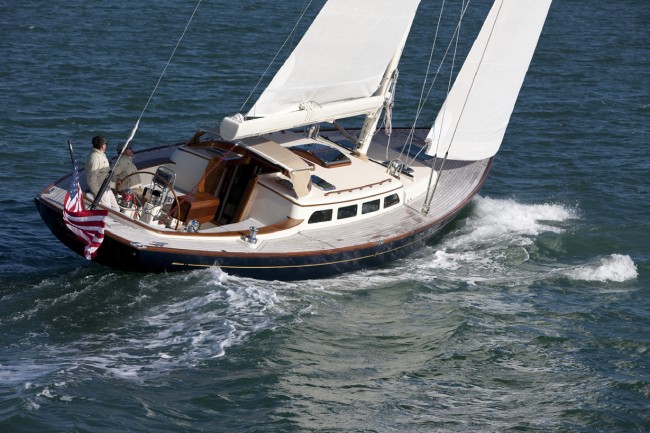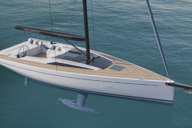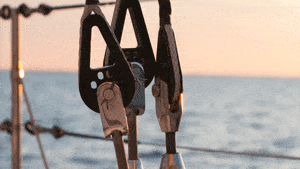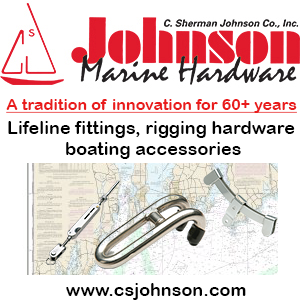In an age when so many cruising boats are evolving toward hulls with large interior volumes, long waterlines and short rigs suitable for the Intracoastal Waterway, the Morris M52 looks like a throwback to another simpler, more gilded age. With her long, sweeping sheer-line, graceful overhangs fore and aft, and low, squared-off cabin with a classic butterfly hatch, the 52 evokes the beautiful classics from the days of Herreshoff, Alden, Rhodes and Burgess. Even among all of the amazing sailing yachts that were in Newport, RI last summer when we sailed the new 52, the boat stands out as a true thoroughbred.
We joined the 52 at the Newport Shipyard and were happy, in this instance, to remove shoes before climbing aboard—not something I generally like to do. But the immaculate teak decks, the shining stainless stanchions, hardware and winches, and the varnished teak toe rail and trim together announced that this was a proper yacht that we did not want to scuff.
We fired up the engine and were pleasantly surprised at how quiet it was in the cockpit; the splash of the exhaust was louder than the engine itself. We dropped lines and motored carefully from the crowded marina into Narragansett Bay. The 52 has a high aspect spade rudder and a bulbed cruising fin keel. Under power it steers effortlessly and when we had to back the boat into her slip at the end of the day, it steered in reverse without griping or sideways prop walk.
The 52 is rigged with an 80-foot tall carbon spar, an in-boom roller furling mainsail and a self-tacking fractional jib. All of the running rigging leads belowdecks via conduits and aft to the control stations, i.e. huge electric winches and line clutches on either side of the helm. This keeps the decks free of clutter and enables one person at the helm to manage all aspects of sail trim with the push of a button or two.
In-boom furling mainsails can be tricky to furl and unfurl without getting overrides on the boom’s mandrel since the boom itself has to be set up when furling at an 89.5 degree angle to the mast. The 52, however, was equipped with the new Holmatro boom vang, which has a preset adjustment that positions the boom exactly with the press of a button. The main unfurled and hoisted and later rolled up without any snags or overrides. This detail says a lot about how the 52 has been set up for simple but precise sail handling.
The 52 was equipped with beautiful sails and the rig itself was tall by modern standards, so we had a lot of mainsail to control. We rolled out the jib on its Harken electric furler and trimmed for close-hauled sailing out of the mouth of the bay. The first sensation when she puts her shoulder down and accelerates is the sense of raw power in the rig; then you notice how close you are sailing to the wind. Being long and narrow and with tight sheeting angles, the 52 claws to windward like a 12 meter, and once in the groove she stays balanced and straight as an arrow. In light airs, she is a rocketship to windward.
We tacked out to sea for a while and then flopped over and broad-reached our way homeward, jibing from reaching angle to reaching angle as we went. With the small self-tacking jib, you can’t run dead downwind efficiently, so tacking downwind is the way to go. Off the wind, the 52 slipped along gracefully and had a remarkably good turn of speed.
Like her little M-Yacht sisters, the 52 is a fun and fast boat to sail. With all lines led aft to the helm, it is easy for one person to manage trim, and with the rig set up for multiple sail adjustments it is easy to perfect sail shape to the breezes and angles you find when coastal sailing.
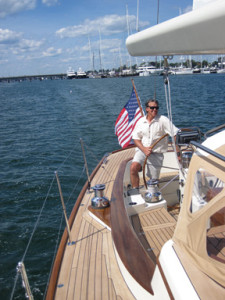 MORRIS STYLE
MORRIS STYLE
Below decks, the 52 offers a simple, elegant interior finished in the finest Maine-built fashion. With only 14 feet of beam to work with, the saloon feels narrow by modern standards, but has everything you need for comfortable living aboard and fine entertaining.
The master stateroom forward has a queen-size berth built on the centerline, a full height hanging locker, and plenty of storage space for clothes, shoes and linens. The master head compartment is well laid out with a separate shower stall.
The saloon has a U-shaped dinette to port and a bench settee to starboard with the chart table at its after end. The galley is compact but has ample counter space for preparing meals and washing up, and easy access to the fridge and storage compartments.
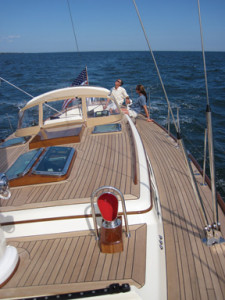 The 52 comes standard with a guest cabin aft and to port, with a day head just forward of it. The version we sailed had this good-size cabin plus a single pilot berth built into starboard aft of the galley so there was room aboard to sleep five comfortably.
The 52 comes standard with a guest cabin aft and to port, with a day head just forward of it. The version we sailed had this good-size cabin plus a single pilot berth built into starboard aft of the galley so there was room aboard to sleep five comfortably.
With raised panels on the bulkheads and doors and the antique white and varnished cherry joinery, the 52 has a classic look that has endured aboard American yachts for generations and will no doubt endure for generations to come. Not opulent, but certainly very elegant, the 52 has the feel of a family heirloom.
BWS THOUGHTS
We have sailed and reviewed a lot of boats over the years and always enjoy the opportunity to sail a new Morris. Like his father Tom, Cuyler Morris understands that there will always be a market for craft that are built with passion to a very high standard. Throughout the boat, every detail has been thought through and then crafted by hand to be highly functional and amazingly attractive. Whether you are staring at your own reflection in the deep varnish of the saloon table or trimming the mainsail to the nth degree with well-positioned winches, clutches and buttons, you know that sailing an M52 is a very special and unique experience.
Morris M-52
LOA 52’11”
LWL 38’02”
Beam 14’00”
Draft, standard 6’8”
Draft, shoal 5’8”
Displacement 34,064 lbs
Ballast 11,391 lbs
Ballast, shoal 11,947 lbs
Sail area 1,414 sq ft
Air draft 80’
Water 100 gals
Fuel 80 gals
Holding 40 gals

